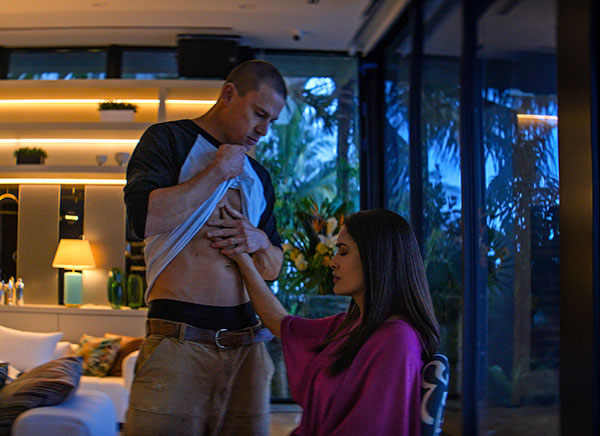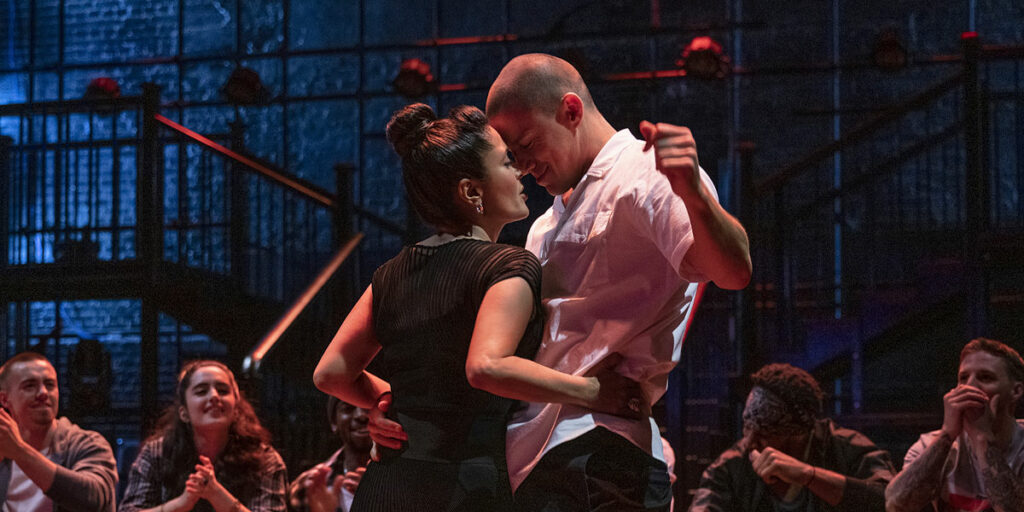Channing Tatum has the star power and allure, but Magic Mike’s Last Dance ends up quite stale in comparison with the other two installments.
Like Zac Efron, Channing Tatum is one of the few actors who embody a true Hollywood star’s allure, charm, and physicality. Sure, both of their filmographies have been filled with terrible projects and disasters. Still, they both have roles in films that shine a light on their talents (both hidden and recognizable) and knacks for delivering great performances from various genres. Tatum in particular has great comedic chops and has demonstrated his action-star lead potential. Although his work in Foxcatcher gets the most acclaim from the general public, his partnership with Steven Soderbergh is what has established his medley of talents, primarily the Magic Mike franchise, which is closing its trilogy with Magic Mike’s Last Dance.
When the first Magic Mike film was released, I was pretty snuffy about it. But after revisiting the film and its sequel a few years ago during the pandemic, I realized that they were highly enjoyable and charming pictures. Of course, they have plenty of flaws, yet most of them are dismissed because Soderbergh’s vision enthralls you, and their nature is campy and raunchy.
The usual division of skepticism and excitement arrived when the release of a third film, Magic Mike’s Last Dance, was announced, with Soderbergh returning to the director’s chair. I unfortunately have to say that my experience watching the latest installment in the strip-tease trilogy lies between the two aforementioned emotions. While Tatum’s acting presence gives it a proper amount of charm and flavor, the movie comes across as quite stale compared to the original and its follow-up.
After a lengthy hiatus, Mike Lane (Channing Tatum) returns to the stage for one last dance. Due to a business deal going the wrong way, Mike is broke and working as a bartender around Florida. However, Mike gets a chance to go on another venture with a wealthy socialite, Maxandra Mendoza (Salma Hayek), who offers him a job he can’t refuse. Max and Mike go to London to transform a dusty theater into a place where women can partake in the sensual splendors of dance. Everything is on the line for Mike: this is the last chance he has to showcase his skills for an opportunity that might bring him success at last. Following the sequel traditions of films that didn’t need a third installment, Magic Mike’s Last Dance obviously takes its narrative overseas.

This always happens when a series of films is nearing its end, because the people involved don’t know how to conclude the titular character’s story. And I’m saddened to say that the latest Mike Lane adventure does not sum up to a superb and delightful story. The main problem this film suffers from is its combination of style and substance. It’s frustrating when the camp and charming silliness of Magic Mike’s Last Dance’s narrative isn’t matched by its style, substance, or significance, and this makes it hard to justify the film’s existence other than filling seats during the Valentine’s Day weekend box office. I wasn’t expecting the most elegant and fully analyzed articulation of the “post”-pandemic American Dream and capitalism amidst such circumstances from a movie that relies on a rich woman opening a club to make Mike Lane’s last hoorah, but, this time around, there isn’t much going on outside of formulaic romance-comedy scenarios.
With Soderbergh involved in almost all tasks imaginable, as usual in the post-retirement era of his career, plenty of ideas are being tackled. The other Magic Mike films explored these ideas and other ones as well, like finding pleasure during a later stage in your life. Yet, the thing is that, in the saga’s previous installments, those ideas managed to fit into the cracks of the popcorn entertainment being provided. In Magic Mike’s Last Dance, they don’t, and the film is quite stale and a tad joyless in comparison, lacking the gumption of its introductory picture and the lively pleasure of its follow-up. Soderbergh does have a unique vision and lots of creativity when it comes to reinvention and delighting the audience, and he demonstrates this in the film’s beginning and ending sequences. They are, by far, the film’s best moments, and the former delivers a fascinating climax to the trilogy.
Those sequences deliver the classic Magic Mike energy and eroticism. However, what lies between the prologue and epilogue is formulaic to a fault, remaining jejune and uninteresting for most of its runtime. The authenticity of the Florida and Myrtle Beach scenarios in the first two Magic Mike films is removed to focus on the fictitious erotic fantasy set in London. And while Channing Tatum has the gift to sell that part of the movie with ease thanks to his acute comedic timing and overall presence, he can’t carry it on his own. It comes to a point where you begin to get a bit tired of the dynamics between the characters who aren’t Mike because they are one-dimensional and lack personality, unlike Richie (Joe Manganiello), Ken (Matt Bomer), Dallas (Matthew McConaughey), or Tito (Adam Rodriguez) in the other movies.
By removing the original’s gritty, naughty, and titillating aspects, Soderbergh loses the vision of what makes these films so engaging for the public. You’ll wish you saw more of what happens in the last twenty minutes during the rest of the film. The “splash-zone” closing dance routine, where Mike and his dancing partner waltz amidst the wet floor, keeps us wanting more of those eroticized sequences, but when it ends, a question pops into your head: is it worth the wait until that point in the movie? Well, slightly.
Magic Mike’s Last Dance demonstrates that we need Channing Tatum in more movies, because he has the star power to elevate them. Nevertheless, as a conclusion to a more-so beloved trilogy, it is disappointing, although occasionally intriguing.
Magic Mike’s Last Dance was released in theaters in North America on February 10, 2023 and internationally from 8 February 2023, and is now available to watch on digital and on demand.

